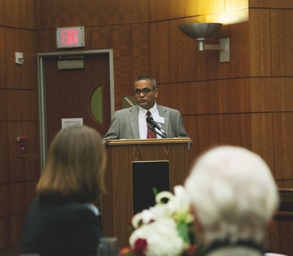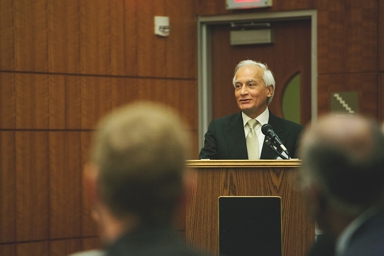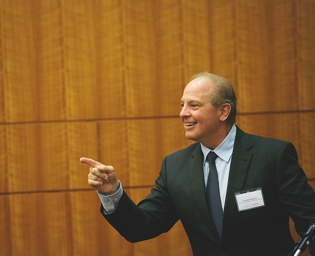On the evening of March 31, 2015, the University of Houston held a dinner honoring alumni Manmohan Singh Kalsi, Ph.D. (“Kalsi”), and his wife Marie-Luise Schubert Kalsi, Ph.D. (“Ise”), who are both officers of Kalsi Engineering, Inc. The event was held at the Estess Alumni library in the Honors College Commons area, and was attended by staff members from both organizations—including several professors emeriti who taught Kalsi as a student in the 1967 to 1975 time period.
The opening remarks were given by Dr. Rao, Associate Chair of the Mechanical Engineering Department. Dr. Rao began by summarizing Kalsi’s career as a graduate student, describing how Kalsi’s experiences as a full-time engineer provided motivation to take many advanced engineering courses, and to ultimately pursue a Ph.D. Dr. Rao also described how the fundamentals of tribology offered at the University of Houston have helped Kalsi contribute to several segments of industry.
Dr. Rao then went on to describe how Kalsi has maintained close contact with the engineering department over the years, because he has always wanted to give back to the university. For example, Kalsi has long served on the Industrial Advisory Board and the Leadership Board, and his scholarship donations have helped numerous engineering students attend the university. As another example, Dr. Rao mentioned that because of Kalsi’s input, the curriculum now includes mandatory courses on finite element analysis and machine design. Dr. Rao closed by recognizing the endowed professorship that was established by Kalsi and Ise, and presented a memento of appreciation. The professorship was established in honor of the memory of one of Kalsi’s advisors, Professor Gabriel Fazekas, who had a profound influence on Kalsi’s education and subsequent career.
Following Dr. Rao, Kalsi gave a heartfelt, poignant speech about the University of Houston, and the wife he first met there. He began by acknowledging Ise, explaining that she would signal him with one raised hand if he was getting too long-winded, and would raise both hands to force him to stop. Next, he explained that the site of the dinner has a very special significance to him, because it is the place where he first met Ise. He was on his way from the Cullen College of Engineering to set up an Indian food booth at a meeting of the International Student Caucus, and she was on her way to set up a German food booth. He sped up to intersect her path at just the right instant to engage her in conversation, and the rest—as they say—is history. He concluded the beginning of his speech by thanking Ise for her unwavering support as he pursued his graduate studies and a concurrent full-time career, and later, when they took the risky and time-consuming step of founding a business together. He credits her support for a significant part of his professional success.
Next, Kalsi spoke at length about his deep gratitude to Professor Fazekas, and the profound influence Fazekas had on his professional trajectory. The very first course Kalsi took at the University of Houston was taught by Fazekas: The Mechanics of Friction, Wear, and Lubrication. Fazekas taught how friction, wear, and lubrication were such large unknowns in many types of equipment, and how an improved understanding of them would lead to improved predictability, reliability, and longevity. Kalsi was impressed that Fazekas taught with a passion that he hadn’t witnessed with too many other professors. Kalsi credits this passion to Fazekas’ long and distinguished career in industry before establishing himself as a professor.
Kalsi said that Fazekas is the person who inspired him to think about complex phenomena, and taught him how to model such phenomena in simplistic terms. When Kalsi was looking for a thesis topic, Fazekas told him about a slanted O-ring concept. The purpose of the slant was to cause the O-ring to be hydrodynamically lubricated when the mating shaft was rotated. The concept appealed to Kalsi right away because it seemed to make good intuitive sense—and then Fazekas told him they tested the concept and it didn’t work. Fazekas had always considered this testing failure to be an unfinished chapter of his life, and believed that success could be achieved if all the variables that control interfacial film thickness generation could be analyzed. Kalsi took on this analysis as the subject of his thesis. He became so enthralled with the subject that he went on to test the slanted O-ring concept, even though such testing wasn’t a thesis requirement. As a result, Kalsi was able to successfully confirm his analytical work.
This was Kalsi’s first experience at comparing the friction of two different high pressure rotary seal designs. He tested one O-ring in a circular groove, and another in a slanted groove arrangement that was designed in accordance with his analytical work. The performance difference between the two designs was dramatic. From this graduate work, Kalsi learned the importance of analysis, and confirmation by testing. Fazekas suggested that if Kalsi were willing to do more homework, the result could be a commercial product someday—a dream that eventually came true. Obviously, Fazekas’ background and passion had a tremendous influence on Kalsi’s life.
Kalsi went on to thank the professors emeriti attending the dinner, naming them one by one, and in many cases describing the groundbreaking nature of the courses they taught, why he took them, and how those courses helped his career. As he has done on many other occasions, Kalsi described the Cullen School of Engineering as having a faculty that any school would have a hard time matching. Kalsi then described how he first began to collaborate with the University of Houston on research projects, and provide year-to-year funding, and how this eventually led to establishing the endowed professorship. Kalsi hopes that the professorship will help attract more faculty members of the highest quality.
Kalsi concluded his lengthy, but entertaining speech by acknowledging the contributions of the Kalsi Engineering staff, and noting that his wife had not raised her hand yet. Daughter Isken then interjected that while that may be true, she could nevertheless feel the tension rising in her mother. Dr. Tedesco, Dean of the Cullen College of Engineering, provided humor-filled closing remarks that acknowledged and complemented the friendship and generosity of Mr. and Mrs. Kalsi.



